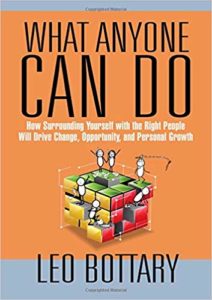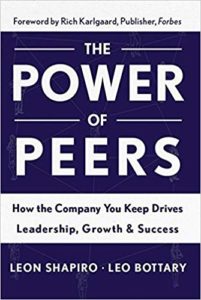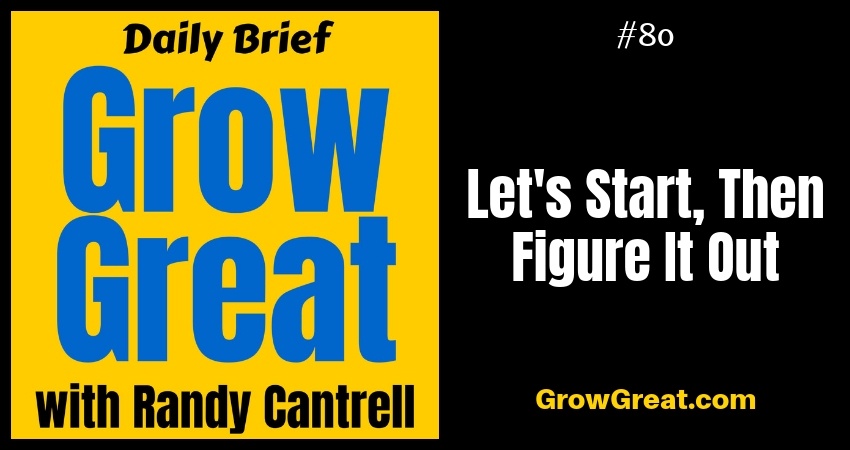Don’t Compare Somebody’s Past To The Future You Hope For – Grow Great Daily Brief #85 – October 18, 2018
Podcast: Play in new window | Download (Duration: 9:16 — 9.0MB)
Subscribe: Apple Podcasts | Spotify | RSS | More

Yesterday we asked the question: “Do You Really Have To Find Somebody Who Has Already Done What You Want To Do?” The answer is, “No.”
Today, let’s talk about the temptation to compare somebody’s past accomplishment with what we hope to accomplish in our future. Hint: it’s not likely the best way to spend our time or energy.
Here’s how it goes. We want to accomplish something we’ve never accomplished before. We see somebody else – maybe a whole lot of somebodies – who have done it. So far, so good.
The problem isn’t the observation or the attempts to learn. The problem is comparing their achievement – the final result – with the required work we’ll have to put in to accomplish the same thing. Or something similar.
It’s the difference in looking at the finished product versus the raw materials required to build it. Or the difference in the world-class performance versus the years of toiling it took to be able to perform at that level.
I get it. All of us do.
We want a better future. That’s as it should be. People need hope, purpose, responsibility, and achievement (even the quest for achievement makes a positive difference).
What we don’t always want is the toll required. We’d like to get in the express lanes toward our fondest dreams without paying the price required.
Part of this phenomenon is driving me to make some small adjustments in this podcast. I’m going to start including, as much as possible, that hard stuff. The gap between knowing and not knowing. The gap between failure and success. The gap between where we’re at and where we want to be. It’s in that gap where we spend our lives, but so few people talk about it. Instead, we’ve been fooled into thinking we have to focus on the goal. I’ve contributed as much as the next guy or gal to the storyline of keeping your eyes fixed on the horizon where your big goal can be seen. It has some value, but it’s not where I believe the most value is found.
Rather, the most value I’ve learned is found in that no man’s land between not knowing and knowing. I also have learned why it’s so hard.
You can’t unlearn what you’ve already learned. Even with the concentrated effort, it’s hard to go back and remember the experience before you learned it. I know I learned my ABC’s and basic math. I rationally know there was a time in my life when I didn’t know any of that, but I can’t remember life then. In the last decade, I’ve learned a ton of things I didn’t know before, but it’s virtually impossible for me to go back and put myself in a mental state where I can fully remember life before that knowledge.
Then there’s the magic of remembering it the way we want versus the way it really was. Kinda like our parents walking uphill in the snow, both ways, to school. We can amplify the difficulty. Or minimize the timing, chance or serendipity. We can remember how vital our role was, while we minimize the role anybody else may have played.
Ecclesiastes 9:11 “I returned and saw under the sun that— The race is not to the swift, Nor the battle to the strong, Nor bread to the wise, Nor riches to men of understanding, Nor favor to men of skill; But time and chance happen to them all.”
It’s true, but we don’t like to acknowledge that when we’re looking at our success. We’ll happily admit how true it is when we’re looking at somebody else’s success though. “Boy, were they lucky!” Or, “Boy, did he have great timing!”
You know why I fixate on the phrase “you’ll figure it out”? Because you will. You have to. Others can help (that’s my professional mission…to evangelize that notion and to help entrepreneurs surround themselves with people who will help). But you have to find your own path and understand that close examination or the cursory examination of somebody else’s finish line isn’t going to necessary show you the best path to take as you leave your own starting line.
Use it for inspiration. Use it to help spark your own process to figure it out. Just don’t waste time trying to dissect it in hopes you can replicate it. You can’t. You’re not them. You’re YOU.
Your path may look similar. It may not look like it even belongs in the same universe. That doesn’t matter. Don’t be conned into thinking it does.
Somebody else’s’ creation isn’t your own. Envy and jealousy aren’t positive paths to an improved future. You’ll never grow as great as you can by obsessing on somebody else’s accomplishment.
Instead, devote yourself to putting in the work to figure out what you can best accomplish. Figure out why you want what you want. Get really clear about it. Then set about to spend whatever time is necessary between where you are right now and where you want to be. And here’s the real hard part. You don’t know how long that gap is going to last. It could be months. It’s more likely going to be years. Depending on how you’re defining “where you want to be.” Short-term and long-term are relative things.
Life has been defined as the dash that appears on grave markers. The dash between the date of birth and the date of death. Think of that dash as the gap between where you currently are and where you most want to be. It’s where living happens. It’s where you question, test, try, fail, fail some more, then fail some more, achieve a little success, make a million adjustments and persist for however long you’re willing…until you give up or until you’re able to plant your flag or run your victory lap.
Let’s aim for the lap. I’m with you. You’ll figure it out.
Be well. Do good. Grow great!








 Leo and I were talking about some future plans we have individually and collectively. At some point Leo challenged me to consider an approach that was 180 degrees different than the one I had planned. We talked about it, with me asking him to clarify so I could more fully understand. It made sense to me. I hadn’t considered it before. There’s
Leo and I were talking about some future plans we have individually and collectively. At some point Leo challenged me to consider an approach that was 180 degrees different than the one I had planned. We talked about it, with me asking him to clarify so I could more fully understand. It made sense to me. I hadn’t considered it before. There’s 